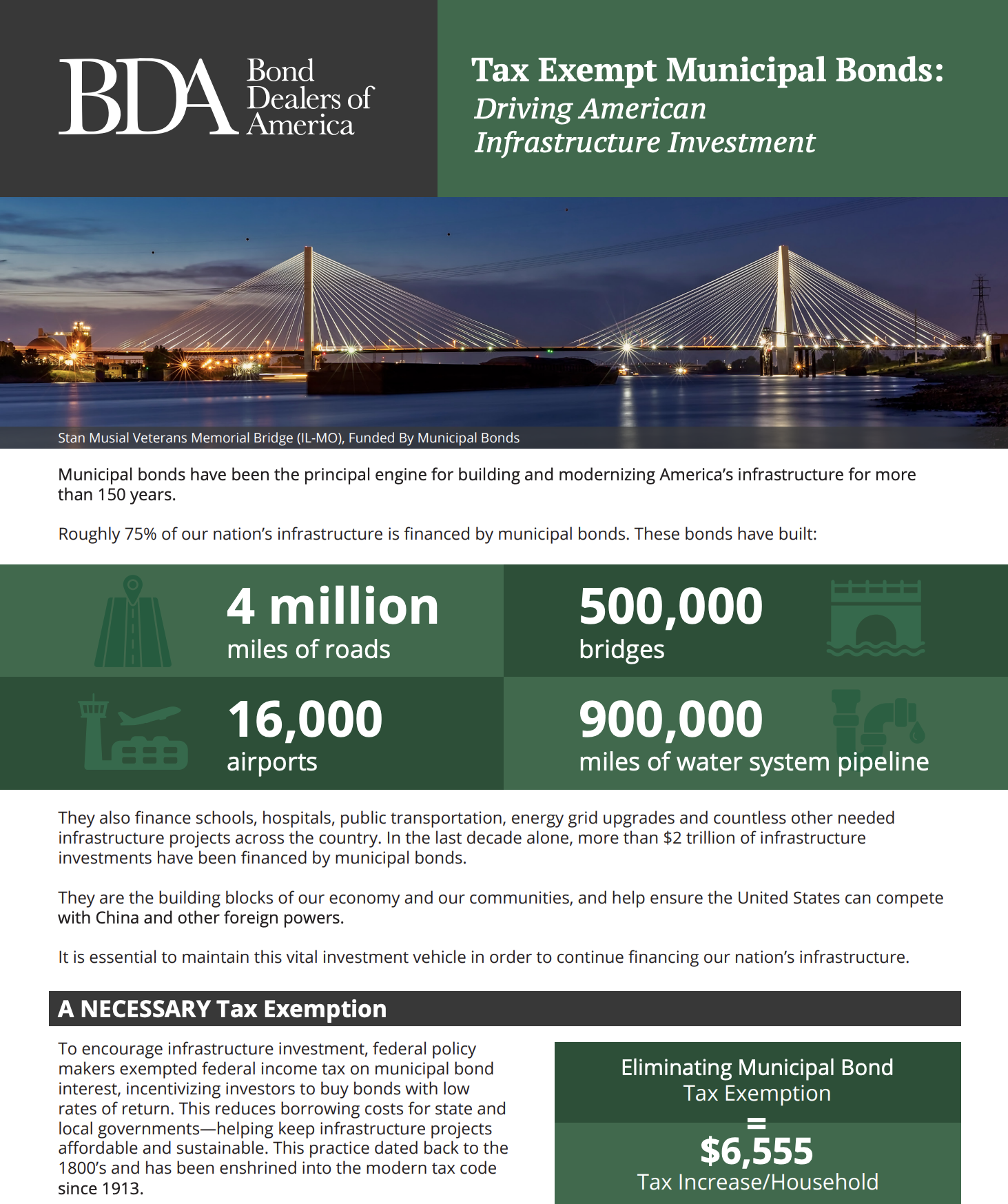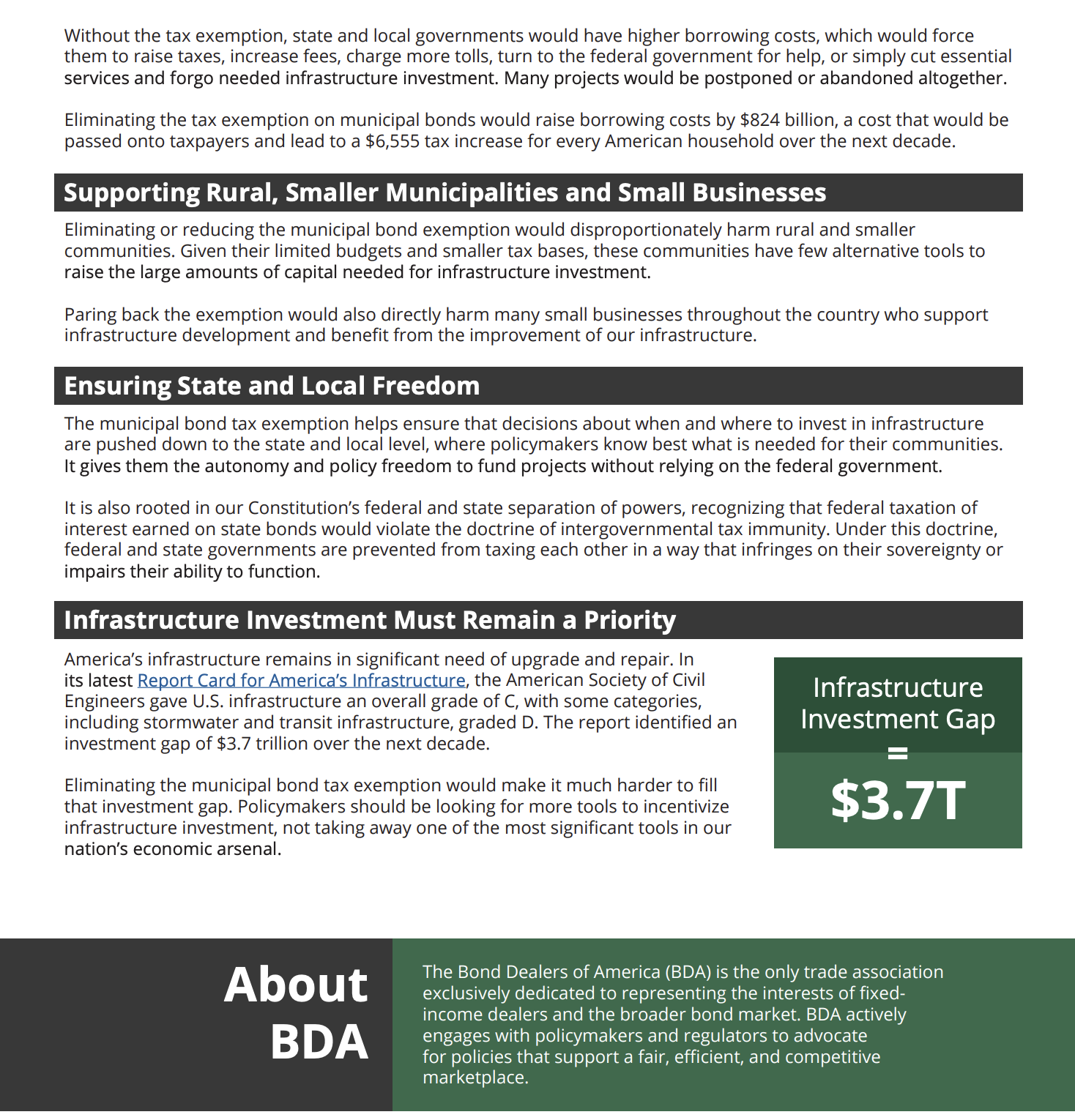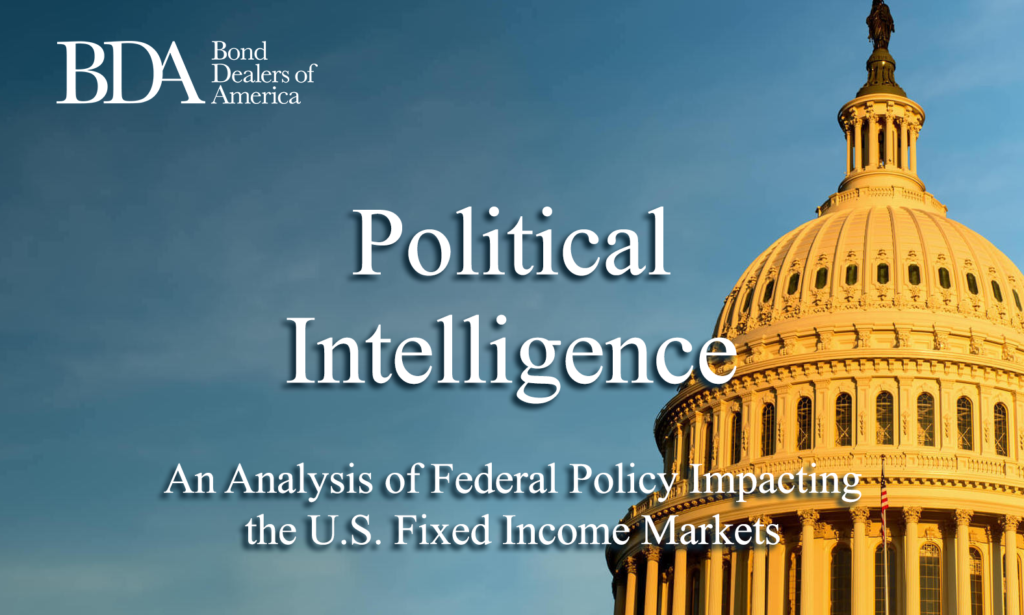The Bond Dealers of America (BDA) deploys a variety of advocacy and grassroots tools to influence the policy-making process and promote a more efficient fixed-income market. Regulatory authorities in Washington, D.C. recognize the BDA as an authority on technical issues and market trends. Through a variety of events and forums, our members have the opportunity to meet regulators and legislators to discuss market and business challenges. Our federal Political Action Committee (PAC) supports legislators who work to advance policies that improve the fixed income markets.
Federal Legislative and Regulatory Priorities & Accomplishments
Legislative Advocacy
Defending and Advancing Municipals Ahead of 2025 Federal Tax Reform
The BDA, and utilizing our MBFA coalition of municipal market leadership, continues to lead industry effort’s promoting municipal bonds on Capitol Hill. The BDA alongside the Public Finance Network (PFN), led by the Government Finance Officers Association, has spent considerable time and effort to grow bipartisan support of the tax-exemption, protection, and expansion of private activity bonds, as well serval additional municipal provisions including the restoration of tax-exempt advance refundings, reintroduction of legislation to raise the bank qualified limit and these efforts are beginning to show results.
Tax-Exemption Remains Strong
As the cornerstone of BDA advocacy, the municipal bond tax-exemption continues to gain bipartisan support, even as bipartisanship legislating continues to flail on Capitol Hill. A main pillar of support is the House Municipal Finance Caucus led by Reps. Dutcher Ruppersberger (D-MD) and Rudy Yakym (R-IN). The Caucus, founded in 2016 by Congressman Ruppersberger, serves as a forum for discussing issues related to funding for state and local government initiatives. Key issues include protecting the tax-exempt status of municipal debt, ensuring a robust market for municipal securities, and understanding the impact of financial regulations on municipal finance.
The BDA continues its educational efforts in both the House and the Senate with eyes squarely focused on 2025 when portions of the 2017 Tax Cuts and Jobs Act expire and provisions to pay-for extensions of the tax cuts will likely be debated. The municipal bond tax-exemption remains a top-10 tax expenditure for the federal government—making it a potential target to use as an offset for additional spending as concerns continue to grow on the debt and annual deficit.
Support for Advance Refundings Grows
The BDA is leading industry advocacy for H.R. 1837, legislation that would fully reinstate municipal advance refundings. The BDA continues to work simultaneously with Capitol Hill and issuer community in PFN to advance this key policy initiative.
The Investing in our Communities Act was introduced this Spring by Representatives David Kustoff (D-TN) of the House Ways and Means Committee and Dutch Ruppersberger (D-MD) Co-Chair of the House Municipal Finance Caucus. On the Senate side, Roger Wicker (R-MS) and Debbie Stabenow (D-MI) reintroduced the LOCAL Infrastructure Act and are accompanied by 16 bipartisan co-sponsors, a high-water mark in support in the upper chamber.
Having support of a sitting Member of the Ways and Means Committee sponsor this legislation and having robust bipartisan support in the Senate cannot be understated, however, many hurdles need to be cleared for passage.
It should be noted that Majority staff in the House have softened their stance on the legislation but noted that there is no immediate push to pass this year, instead look towards the end of this Congress next year or beyond.
BDA Membership in DC
This summer, the BDA hosted a Public Finance Leadership Roundtable in Washington, DC hosted by Quarles and Brady. The event featured robust discussion on timely public finance topics with senior representatives from 10 BDA member firms.
Key discussion topics included:
- Exit of Bulge Bracket Firms from the Business and Impact on Regionals
- Challenges of Operating in a Non-Refunding Environment
- Compensation and Retention Challenges for Junior Bankers
- Key Regulatory Issues Including Remote Work and New Issue Pricing
The group also heard from Sean Gard, Chief of Staff for Rep. Gwen Moore (D-WI) a sitting Member of the tax-writing House Ways and Means Committee where he provided an update on the remainder of 2024 and a positive outlook for muni legislation in 2025.
The following day, the group took to the Hill to meet with senior staff members in key Ways and Means offices as part of our ongoing fly-in series focusing on the muni tax-exemption.
The meetings focused on promoting the muni tax-exemption in the context of infrastructure financing and also pressed staff to consider key muni provisions in next years probable tax bill.
These provisions include:
- The Restoration of Tax Exempt Advance Refundings
- Raising the Bank Qualified Limit to $30 Million and Indexing to Inflation
- Expanding the Use of Private Activity Bonds
The BDA is planning quarterly fly-ins through 2025. If you, or your firm is interested in participating in these events, please let us know.
Regulatory advocacy
FINRA Syndicate Closing Rule
On January 1, 2023, changes to FINRA Rule 11880 took effect, shortening the time syndicate members in corporate bond underwritings receive deal revenue from the lead manager. Following a years-long BDA advocacy campaign, corporate comanagers now receive 70 percent of revenue derived from corporate bond transactions within 30 days and the remainder net of syndicate expenses within 90 days. The previous rule was senior managers had 90 days to pay out all revenue.
FINRA Margin Rule
After an eight-year rule making process, FINRA finally completed changes to its Rule 4210 governing margin. Under the changes, firms will need to begin collecting and holding variation margin on sales of new-issue agency MBS under certain circumstances when the price of the counterparty’s position drops below a designated threshold between the trade and settlement dates.
The SEC originally approved the Covered Agency Transactions (CAT) amendments to Rule 4210 in 2015. Those amendments have largely never taken effect. In the final amendments approved in 2023, FINRA made several key changes in the final rule advocated by BDA, including dropping a requirement from the 2015 rule changes that firms collect both maintenance and variation margin and adding an option for firms to take a capital charge in lieu of collecting margin. Most importantly, the rule changes will have been delayed by nine years by the time they take effect. The compliance deadline for the CAT amendment is May 22, 2024.
One-Minute Trade Reporting
Both the MSRB and FINRA have parallel proposals to shorten the time for dealers to reports trades to the Real-time Trade Reporting System (RTRS) and the Trade Reporting and Compliance Engine (TRACE) from 15 minutes to one minute after execution. As of this writing, both the FINRA and MSRB boards have approved versions of the proposals but have not transmitted them to the SEC for final approval.
Both proposals would require dealers to report trades in applicable municipal and corporate bonds within one minute of execution. In our response to the proposals, BDA raised several concerns about trades which could likely never be reported within one minute. Both agencies have suggested that they will include in their final proposals key carveouts that would make the rule workable, including exemptions for firms with very low trade volumes and for “manual” trades, to be defined in the rule and to include trades conducted by telephone and other trades that require human intervention in execution or processing. Details will come when the agencies transmit their final proposals to the SEC.
Best Execution
The SEC has proposed to impose a new, best-execution rule in addition to existing FINRA and MSRB best execution rules. The proposal would require dealers to develop compliance procedures around evaluating trade prices. Of particular concern is the treatment of “conflicted trades,” which would have special requirements. In the proposal, conflicted trades include principal trades, including riskless principal trades. Conflicted trades would require dealers to survey even more markets than non-conflicted trades. BDA raised these concerns in our letter to the SEC.
The next step in the process will be for the Commission to consider the amended and final proposal.
Small Firms Review
The MSRB has issued a Request for Information on regulatory and other burdens faced by small firms. The MSRB is seeking comment on “any aspects of its rules, or the absence thereof, that may result in undue regulatory, compliance, operational or administrative burdens or other negative unintended impacts on smaller regulated entities.” The MSRB has completed a series of roundtables with minority-, women-, and veteran-owned municipal broker-dealers and municipal advisors. One message that emerged from those meetings is that a more significant distinction in the industry is between large and small municipal BDs, and that is the genesis of the Request for Information. BDA will respond after vetting the issue with members.
Financial Data Transparency Act
In 2022 Congress enacted the Financial Data Transparency Act (FDTA) as part of the National Defense Authorization Act. The FDTA will, among other provisions, require municipal issuers to publish financial disclosure statements in a machine-readable format which will allow software to identify common data elements within the statements. There is a four-year implementation period from the date of enactment. The statute requires the SEC to develop a “taxonomy,” a collection of data items associated with tags thar will make the documents machine-readable. Issuers generally remain opposed to the FDTA.
The SEC has begun the task of building the taxonomy, which will occupy the first two years of the implementation period followed by two years of testing and adoption. There are two areas of concern for underwriters and dealers. First is that at some point in the future the SEC may expect dealers to police issuer compliance with the FDTA standard as current regulations do with respect to issuer continuing disclosure. Second is that the FDTA initiative could impose costs on the MSRB as the market’s disclosure repository which would be borne predominantly by dealers. BDA will continue to monitor the development of the FDTA scheme.


Advocacy Feature

